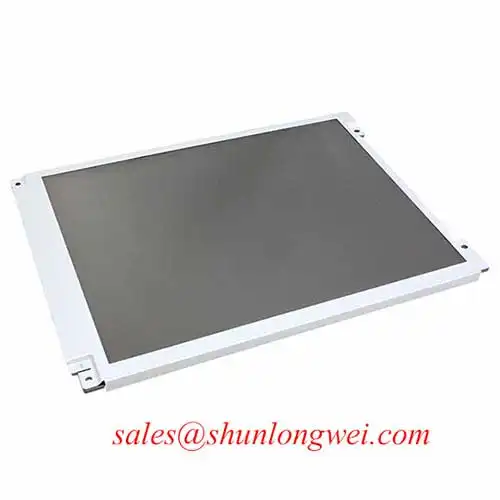Content last revised on February 6, 2026
NL6448AC33-11: An Integrated 10.4-inch VGA Display Solution for Industrial HMI
The NL6448AC33-11 is a 10.4-inch a-Si TFT-LCD module engineered for longevity and ease of integration in demanding industrial environments. It delivers a functional combination of a 640x480 VGA resolution, an integrated analog resistive touch panel, and a built-in backlight inverter. This consolidation of features provides tangible engineering benefits, primarily by simplifying system design and extending the operational life of legacy equipment. What is the primary benefit of its integrated touch screen? It eliminates the need for a separate touch overlay and controller. For legacy HMI systems requiring a robust, all-in-one VGA display, the NL6448AC33-11 offers a streamlined integration path.
Application Scenarios & Value
Streamlining Design and Maintenance in Legacy Control Systems
For engineers tasked with maintaining or upgrading legacy industrial machinery, Human-Machine Interfaces (HMIs) present a significant challenge. The NL6448AC33-11 is particularly valuable in these scenarios. Consider a CNC machine or process controller from a previous generation; its display system often consists of a separate LCD panel, a discrete backlight inverter board, and a third-party touch overlay. This fragmented design increases complexity, cabling, and potential points of failure. The NL6448AC33-11, with its integrated analog resistive touch screen and built-in backlight inverter, consolidates these functions into a single, cohesive unit. This approach directly reduces the bill of materials (BOM), simplifies assembly, and minimizes the internal cabling required, which in turn enhances system reliability and serviceability—a core consideration covered in discussions about the total cost of ownership for industrial displays.
This integration is not just about convenience; it's an engineering advantage. By providing a single module that handles display, lighting, and user input, designers can focus on software and system-level functionality rather than component-level integration and troubleshooting. While the NL6448AC33-11 is a strong candidate for VGA systems, for applications requiring a higher resolution within a similar form factor, the related NL8060BC26-30D offers an 800x600 SVGA resolution.
Key Parameter Overview
Highlighting Core Specifications for System Integration
The technical specifications of the NL6448AC33-11 are tailored for established industrial applications where reliability and compatibility are paramount. The parameters below provide a snapshot of its capabilities, with an emphasis on features that facilitate straightforward integration into existing designs.
| Feature | Specification |
|---|---|
| Manufacturer | NEC |
| Display Technology | a-Si TFT-LCD, TN, Normally White |
| Diagonal Size | 10.4 inches |
| Resolution | 640(RGB)×480 [VGA] |
| Interface Type | Analog RGB |
| Brightness | 120 cd/m² (Typ.) |
| Contrast Ratio | 135:1 (Typ.) |
| Integrated Features | Analog Resistive Touch Panel, Built-in Backlight Inverter |
| Outline Dimensions | 270(W) × 183(H) × 16(D) mm |
| Operating Temperature | Data not fully specified, consult datasheet |
Technical Deep Dive
The Engineering Value of an All-in-One Display Architecture
The design philosophy of the NL6448AC33-11 centers on reducing the engineering burden for system integrators. The inclusion of a built-in backlight inverter and an analog resistive touch panel is a deliberate choice that addresses common pain points in industrial HMI development. Think of it as the difference between buying a pre-calibrated sensor module versus sourcing a raw sensor and building the signal conditioning and power circuitry yourself. The former accelerates development and reduces risk.
Specifically, the integrated inverter eliminates the complex process of matching an inverter to a CCFL backlight's specific voltage and current requirements, a task that can be fraught with compatibility and EMI challenges. Furthermore, having the touch panel factory-integrated onto the display ensures proper alignment and bonding, removing a delicate and often manual assembly step. This holistic approach not only simplifies the initial design but also contributes to a more robust final product with fewer interconnects and potential failure points, a key topic in designing reliable touchscreen interfaces.
Frequently Asked Questions
What is the primary engineering benefit of the NL6448AC33-11's integrated backlight inverter?
The integrated inverter simplifies the power system design by removing the need for a separate, high-voltage CCFL driver board. This reduces component count, minimizes potential EMI, and shortens the design cycle for HMI systems.
How does the analog resistive touch panel simplify HMI design?
It provides a complete input solution in a single package. Engineers do not need to source, qualify, and mechanically integrate a separate touch overlay, which simplifies the mechanical design and supply chain management.
Is the CCFL backlight on this module replaceable?
While many NEC displays of this era feature replaceable backlights to extend service life, official documentation for the NL6448AC33-11 should be consulted to confirm the specific procedure and part numbers for lamp replacement. This feature is crucial for lowering the total cost of ownership in long-term deployments.
What systems are compatible with the Analog RGB interface?
The Analog RGB interface is a standard for many legacy industrial PCs, embedded controllers, and single-board computers. It provides a straightforward, direct connection to the graphics output of these systems without the need for digital interface converters like LVDS or eDP, making it ideal for retrofits and maintaining compatibility.
From a strategic standpoint, the NL6448AC33-11 represents a commitment to supporting the lifecycle of industrial infrastructure. By providing a reliable, integrated display solution for legacy systems, it enables businesses to maintain and extend the value of their existing capital equipment without undertaking costly and high-risk redesigns. This focus on long-term serviceability and reliability ensures that critical machinery remains operational and effective.


